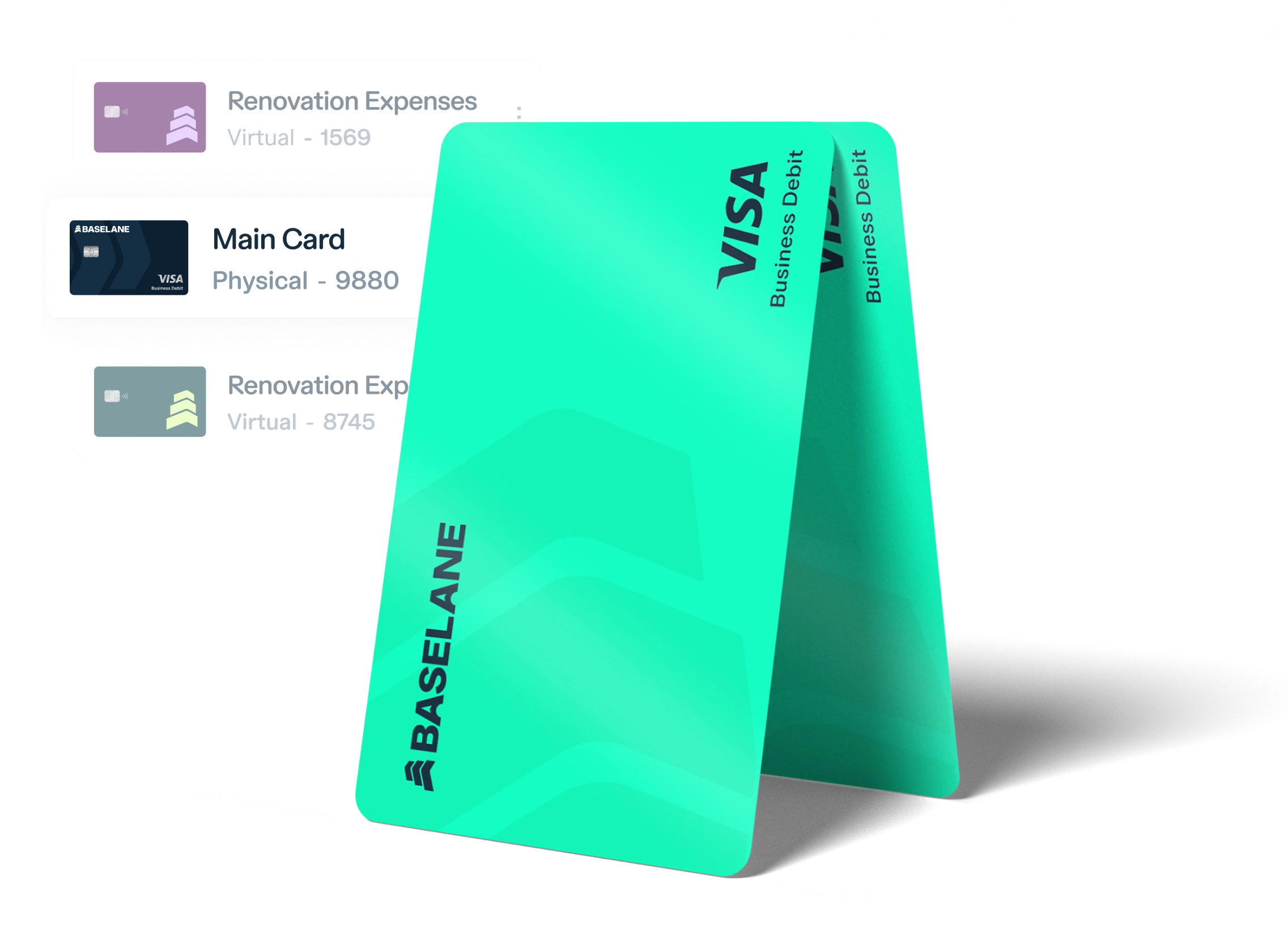Managing finances for multiple rental properties can quickly become complex. Without a clear system, tracking income, expenses, and security deposits becomes a challenge. Establishing dedicated bank accounts for your rental business is crucial for clarity, compliance, and protecting your assets as your business grows. This guide provides a comprehensive strategy for setting up and managing multiple bank accounts tailored to your real estate portfolio.
Key takeaways
- Separating personal and business funds is vital for legal protection and financial clarity.
- Your business entity structure (like an LLC) influences your ideal banking setup.
- Essential accounts include Operating, Security Deposit, and Reserve Funds.
- Choosing a banking partner with features for landlords, like unlimited accounts and automation, is key for efficiency.
- Consistent bookkeeping, reconciliation, and leveraging technology are critical for managing multiple accounts effectively.
Why landlords need separate bank accounts for rental properties
Using dedicated bank accounts for your rental properties is not just a best practice; it’s a fundamental step toward professional and profitable real estate investing. Separate accounts create a clear boundary between your personal finances and your business operations. This separation offers several critical advantages.
Legal protection and asset segregation
Avoiding the commingling of personal and business funds is essential for maintaining the legal protection offered by entities like LLCs. Mixing funds can allow creditors to pierce the corporate veil, putting your personal assets at risk in case of business liabilities. Dedicated accounts help ensure this separation.
Simplified accounting and bookkeeping
Having separate accounts makes tracking income and expenses significantly easier. All rental income and property-related expenses flow through specific accounts. This simplifies the process of categorizing transactions and understanding where your money is going.
Easier tax preparation and audit readiness
Dedicated accounts consolidate all financial activity related to your rentals, providing a clear audit trail. This makes tax preparation much smoother, as you can easily pull reports showing all relevant income and expenses. It also ensures you are ready should you ever face an audit.
Enhanced financial clarity and performance tracking
Separate accounts provide a real-time view of each property’s financial performance or your portfolio as a whole. You can easily see income received, expenses paid, and cash flow for specific properties or your entire operation.
Professionalism
Maintaining separate business accounts presents a more professional image to tenants, vendors, and potential lenders. It shows that you are running a legitimate business operation, not just a hobby. Professionalism can build trust and improve relationships with all parties involved.
What are business entities and their impact on your banking structure?
The legal structure of your rental property business significantly impacts how you should structure your banking. Choosing the right entity and aligning your bank accounts accordingly is crucial for asset protection and operational efficiency. Your chosen entity dictates how you obtain necessary identifiers like an Employer Identification Number (EIN).
Sole proprietorship or partnership structure
Operating as a sole proprietorship or partnership offers minimal legal protection. In these structures, there’s no legal separation between you (or partners) and the business. While you might still benefit from separate accounts for organization, your personal assets remain exposed to business liabilities.
Limited liability company LLC
A Limited Liability Company (LLC) is often the preferred structure for real estate investors due to the asset protection it offers. An LLC creates a legal barrier between business debts/liabilities and your personal assets. Proper banking is essential to maintain this protection.
One LLC for all properties
A common approach is to place all your rental properties under a single LLC. This simplifies legal filings and potentially reduces administrative costs compared to having multiple entities. If you structure your business this way, you would typically use one primary business bank account for this single LLC, managing funds for all properties within it.
One LLC per property
Some investors choose to create a separate LLC for each individual property. This provides the highest level of asset isolation; a liability associated with one property typically cannot impact other properties held in separate LLCs. This structure requires a separate business bank account for each LLC, meaning a dedicated account for every property.
Holding company with subsidiary LLCs
A more complex structure involves a holding company (often an LLC) that owns subsidiary LLCs, each holding one or more properties. This can offer additional layers of protection and organizational benefits. Banking would involve accounts for the holding company and separate accounts for each subsidiary LLC.
How your entity structure dictates your banking needs
Your chosen entity structure determines the type and number of business bank accounts you will need. An LLC requires opening a business bank account under the LLC’s legal name and EIN. If you have multiple LLCs, you must open a separate business account for each one.
This is a fundamental requirement for respecting the legal separation provided by the entity structure. Understanding the difference between business checking accounts and personal is the first step.
Essential bank account types for rental properties
Regardless of how many properties you own or how they are structured legally, certain types of bank accounts are fundamental to managing rental property finances effectively. Having dedicated accounts for different purposes ensures compliance and provides clarity.
The primary operating account for income and expenses
This is the main checking account for your rental business. All rental income is deposited here, and all operating expenses (mortgage payments, property taxes, insurance, repairs, management fees) are paid from this account.
Maintaining a dedicated bank account ensures all operational cash flow is centralized and easily tracked. For short-term rentals like Airbnb, a specific Airbnb bank account within this structure is often useful.
Dedicated security deposit accounts
Many states have specific legal requirements for how security deposits must be handled. This often involves holding tenant security deposits in separate, sometimes interest-bearing, accounts that are distinct from operating funds. Using dedicated security deposit accounts ensures compliance with state laws and keeps tenant funds properly segregated.
Rental property reserve fund account
A reserve fund is crucial for handling unexpected expenses, major repairs, and vacancies. It acts as a buffer to cover costs that aren’t part of your regular operating expenses.
Best practices suggest maintaining a reserve fund equivalent to 10–20% of monthly rent or $5,000–$10,000 per unit. A dedicated account for this fund prevents you from accidentally spending these reserves on day-to-day operating costs.
Choosing the right banking structure for your multi-property portfolio
The ideal banking structure depends on your portfolio size, legal entities, and desired level of financial granularity. There’s no single “best” approach, but certain structures are more suitable for different scenarios. Selecting the structure that aligns with your business goals is key.
Structure 1: One Operating Account for All Properties
This structure uses a single business checking account for all income and expenses across all properties, typically under one legal entity (like one LLC). It’s the simplest structure to manage from a banking perspective.
This works best for landlords with a smaller number of properties under a single entity who use robust bookkeeping software to track income/expenses per property internally.
Structure 2: Separate Operating Accounts Per Property
In this structure, each property has its own dedicated operating account. This can be done whether properties are under one LLC or multiple. This approach offers maximum clarity on the financial performance of each individual property directly within your banking records. It requires opening and managing more bank accounts.
Structure 3: One Business Account Per LLC
If you have multiple LLCs (e.g., one per property), you must open a separate business bank account for each LLC. This is legally required to maintain the separation of assets that the LLC structure provides.
While it means managing several accounts, it aligns banking directly with your legal structure, which is standard for those who open a business bank account for a vacation rental home or other specific property types held in distinct entities.
Structure 4: Centralized vs Decentralized Banking Approaches
A centralized approach funnels most transactions through one or a few main accounts, relying on internal bookkeeping for property-level detail. A decentralized approach utilizes multiple accounts (such as per property or per entity) to provide financial information directly at the banking level.
Your choice depends on how you prefer to manage and view your finances. Using landlord digital banking platforms can facilitate the management of multiple accounts, regardless of the approach.
How to set up your rental property bank accounts
Setting up the right bank accounts involves several key steps, starting with your business foundation. Taking these steps ensures you establish a system that supports your growth and compliance needs from the outset. Properly setting up accounts is critical after you’ve decided how you’ll be separating money in bank accounts.
Choose your business entity recap link
Before opening business bank accounts, finalize your legal structure (sole prop, partnership, LLC, etc.). This decision dictates what documents you’ll need and how accounts must be titled. Review how to open a business bank account for an LLC if this is your chosen structure.
Obtain an EIN for each entity
If you form an LLC, partnership, or corporation, you will need an Employer Identification Number (EIN) from the IRS. This is like a Social Security number for your business and is required to open a business bank account. Sole proprietors may be able to use their Social Security number, but an EIN is still often recommended for business banking.
Select the right bank or financial platform
Choosing a bank or financial platform designed for real estate investors can simplify managing multiple properties. Look for features like the ability to open multiple accounts easily, low fees, and integration capabilities. Consider the best real estate banks that understand investor needs.
Gather required documents
When opening accounts, you’ll typically need your EIN, business formation documents (like Articles of Organization for an LLC), and personal identification for the business owners/signatories. Ensure you have all necessary paperwork ready.
Open the dedicated accounts
Visit the bank or financial platform online to open your required accounts (operating, security deposit, reserve). Ensure the account names precisely match your business entity’s legal name. Open dedicated bank accounts to ensure proper separation from personal funds.
Fund the accounts appropriately
Deposit initial funds into your accounts to cover startup costs, establish reserves, and provide operating capital. Ensure initial funding is properly recorded as owner contributions. Remember to set up your reserve fund with the recommended amount.
Key features to look for in a rental property banking partner
Not all banks or financial platforms are equally suited for managing multiple rental properties. Selecting one with specific features tailored to real estate investors can make a significant difference in your efficiency and financial management. Look beyond standard features.
Business account specialization
Some banks or platforms specialize in business banking for specific industries, including real estate. They understand the unique needs of landlords, such as tracking income per property or handling security deposits compliantly. A partner with real estate expertise is beneficial.
Online and mobile banking capabilities
For landlords managing properties remotely or on the go, robust online and mobile banking access is essential. The ability to check balances, transfer funds, pay bills, and review transactions from anywhere saves significant time. Landlord digital banking solutions offer this flexibility.
Fee structure
Look for business accounts with no or low monthly maintenance fees and minimal transaction fees. Managing multiple accounts means more potential for fees, so finding cost-effective options is important. Learn how to avoid bank maintenance fees to protect your capital.
Integration with property management and accounting software
The ability of your bank accounts to sync automatically with your property management or accounting software is a major time-saver. This automation streamlines bookkeeping, reconciliation, and reporting. Integrated systems provide greater efficiency.
Ability to open multiple accounts easily
For landlords with multiple properties or LLCs, the ability to open numerous checking or savings accounts easily under one business profile is invaluable. Some platforms offer unlimited accounts, making it simple to create a dedicated account for every property or purpose. This supports various banking structures.
Support for security deposit accounts
Ensure the bank offers account types suitable for holding security deposits in compliance with state laws. This might include interest-bearing options or specific account designations. Compliant security deposit accounts are non-negotiable.
Real estate specific tools
Look for platforms that offer built-in tools tailored to real estate investors. Examples include automated transaction categorization based on Schedule E, integration with rent collection, and built-in financial reporting. These features significantly simplify financial management and tax preparation.
For instance, Baselane offers features like unlimited checking and savings accounts, automated expense tracking, and integrated rent collection designed specifically for landlords.
Best practices for managing multiple rental property accounts
Once your accounts are set up, consistent practices are necessary to maintain clarity and efficiency. Adhering to best practices ensures your banking structure supports your business goals. These practices contribute to accurate bookkeeping and financial insights.
Strict separation of personal and business funds
This cannot be stressed enough: never use personal funds for business expenses or business funds for personal expenses. Use dedicated accounts exclusively for their intended purpose. This strict separation is fundamental to asset protection and clean financials.
Consistent use of dedicated accounts
Develop a routine for using the correct accounts for specific transactions. Ensure all rental income goes into the operating account and all property expenses are paid from it. Maintain clear protocols for handling funds like security deposits.
Implementing sub-accounts or tagging for granular tracking
If you use one operating account for multiple properties under a single entity, use sub-accounts or a tagging system within your accounting software to track income and expenses for each specific property. This allows for property-level performance analysis even with a centralized banking structure.
Unlike traditional banking, Baselane allows for automated property tagging to help with this granular tracking.
Maintaining a consistent chart of accounts
Use a standardized chart of accounts that aligns with real estate industry standards (like Schedule E categories). Apply this chart consistently across all properties and accounts. A consistent chart of accounts simplifies reporting and tax preparation.
Regular account reconciliation
Reconcile each bank account with your bookkeeping records at least monthly. This process catches errors, identifies missing transactions, and ensures your books match your bank statements. Regular reconciliation is critical for accurate financial reporting.
Leveraging automation for payments and reconciliation
Utilize automated features offered by your bank or integrated software for tasks like recurring mortgage payments, utility bills, or rent collection (using a rental income tracker). Automation saves time and reduces the risk of missed payments or manual errors. Platforms like Baselane automate rent collection and can integrate banking transactions for reconciliation.
Planning for capital expenditures and reserves
Regularly review your reserve fund balance and plan for future capital expenditures (like roof replacements or HVAC upgrades). Ensure your reserve fund account is adequately funded based on your portfolio’s needs and age. Dedicated savings accounts with the best high-yield online savings account features can help these reserves grow over time. You can learn how to set up high-yield savings accounts easily with platforms designed for landlords.
Common mistakes to avoid with rental property banking
Even with a solid structure, it’s easy to fall into traps that can undermine your financial management and legal protection. Being aware of common mistakes helps you actively avoid them. Preventing these errors saves time and potential headaches down the line.
Commingling funds
As mentioned previously, mixing personal and business funds is a major mistake. It weakens the legal protection of entities like LLCs and makes accounting a nightmare. Always use separate accounts exclusively for their designated purpose.
Poor record-keeping
Failing to track all income and expenses accurately or not keeping supporting documentation (receipts, invoices) hinders effective financial management and tax preparation. Consistent bookkeeping and using tools that capture receipts are vital.
Ignoring state laws for security deposits
Failure to comply with your state’s specific requirements for holding and managing security deposits can lead to legal penalties and disputes with tenants. Always research and follow local laws. Dedicated security deposit accounts are often required.
Choosing a bank without suitable features
Selecting a bank designed for consumers or general businesses rather than real estate investors can mean missing out on crucial features like easy multi-account management, integration, or specialized reporting. Research is key when choosing a banking partner.
Failing to adapt your structure as you grow
Your banking structure might need to evolve as your portfolio grows or your legal structure changes. Sticking with an inadequate system designed for one property when you own ten will lead to inefficiency and complexity. Regularly review and adjust your banking strategy.
Manual management over automation
Relying solely on manual processes like spreadsheets for tracking transactions from multiple accounts is time-consuming and prone to errors. Leveraging automation for data entry, categorization, and reconciliation saves significant time (According to Baselane.com, Coastlineequity.net, Hoozzee.com). Landlords using dedicated accounts and automation features can save an estimated 5–10 hours per month on manual bookkeeping tasks.
Bottomline
Effectively setting up and managing multiple bank accounts is a cornerstone of a successful, scalable rental property business. It provides the necessary financial clarity, legal protection, and organizational structure.
By choosing the right entity, setting up dedicated accounts, selecting a banking partner with landlord-specific features, and adhering to best practices, you can streamline your financial operations.
This allows you to focus less on administrative tasks and more on growing your portfolio and maximizing returns. Leveraging integrated platforms designed for real estate investors can make this process even more efficient, helping you take back time, gain clarity and control, and grow passive income.
FAQs
Commingling funds refers to mixing personal money with business money in the same bank account. This practice can jeopardize the legal protection offered by business entities like LLCs. It also makes accurate bookkeeping and tax preparation difficult.
The number of accounts per property depends on your business structure and preference. You might use one operating account for multiple properties (with internal tracking) or a separate operating account for each property. Additionally, dedicated security deposit and reserve accounts are often needed.
Yes, if you have structured your business with a separate LLC for each rental property, you are legally required to open and maintain a separate business bank account for each individual LLC. This is essential to uphold the asset protection offered by the LLC structure.
Banking automation streamlines tasks like transaction categorization, reconciliation, and payment processing. Features like automated expense tagging and integrated rent collection save significant time, especially when managing finances across multiple properties and accounts. This reduces manual data entry and improves accuracy.








